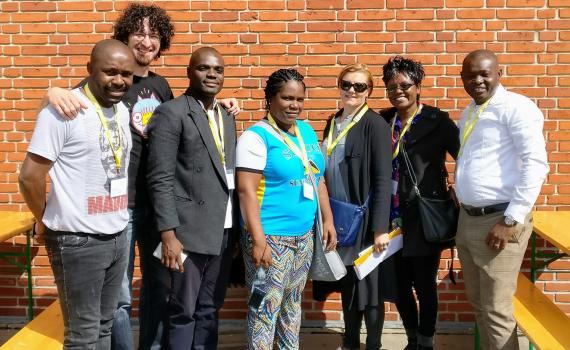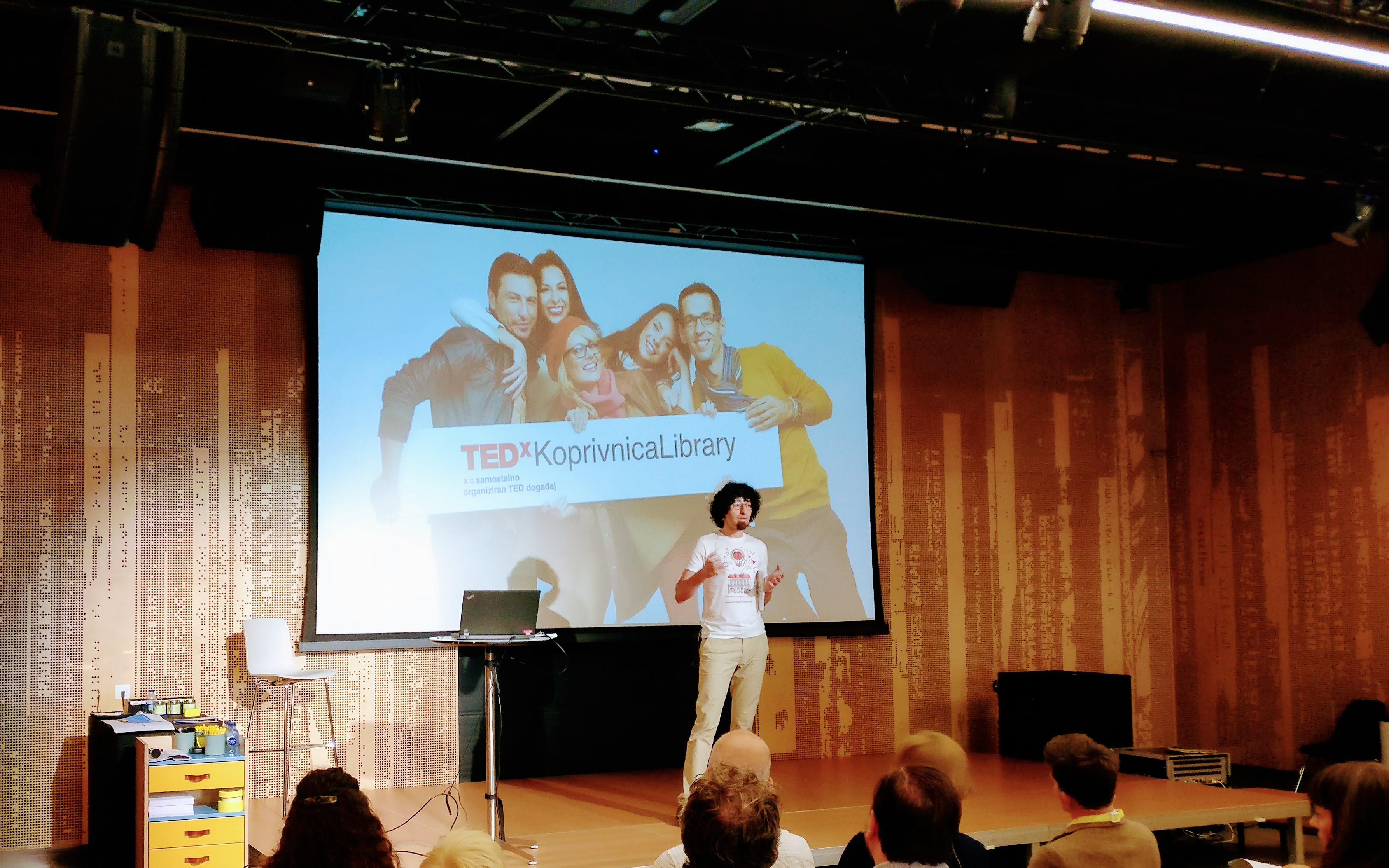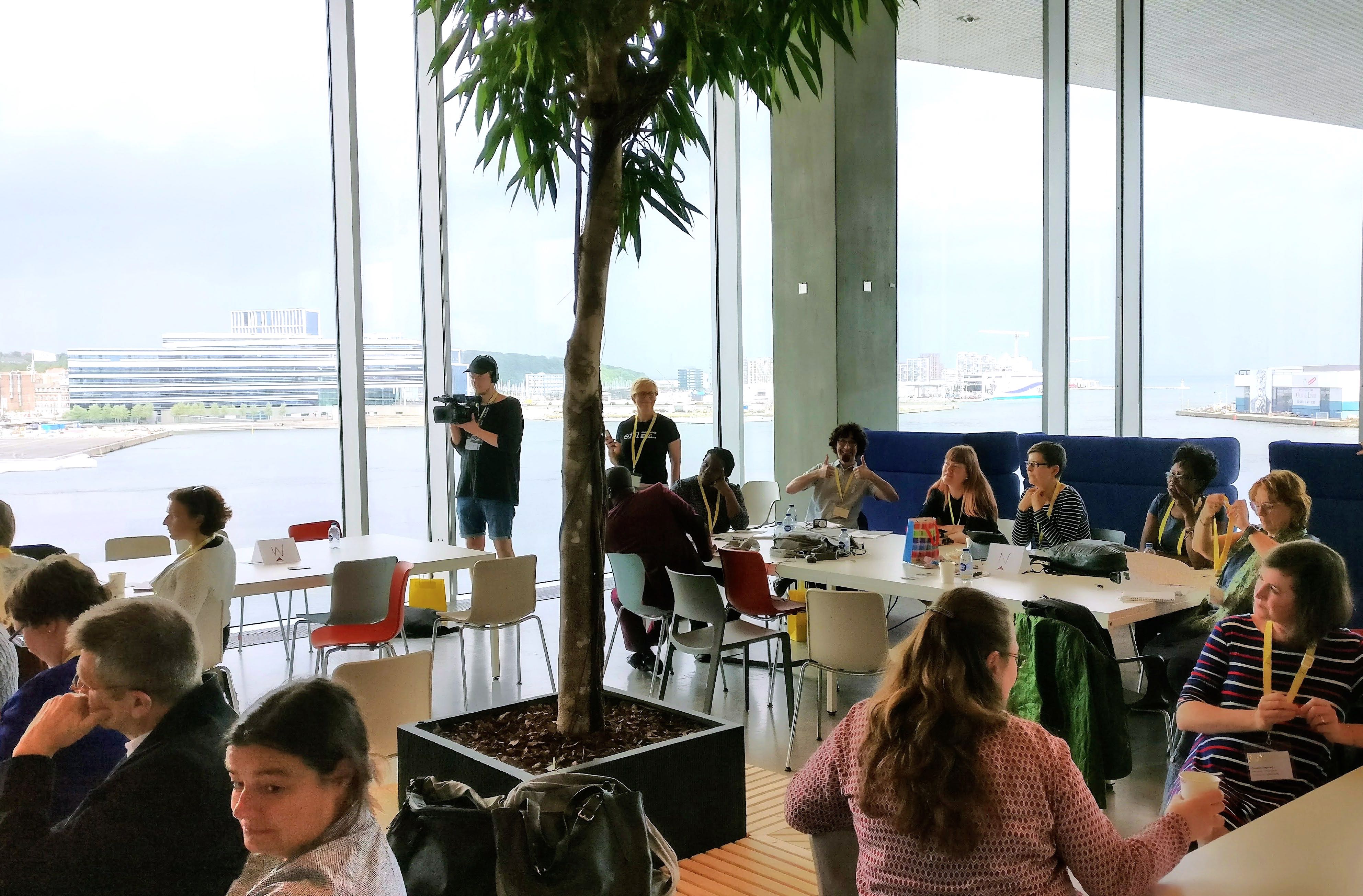
EIFL and Next Library® awarded seven librarians from developing and transition economy countries scholarships to attend the Next Library Festival 2017, which took place in Aarhus, Denmark from 11 - 14 June. After the festival, we asked them to tell us what they had learnt, who inspired them and what festival takeaways they would apply in their libraries back home. Here’s what they said.
Medicinal herb gardens, interactive conferences, playgrounds for children, and hackathons are just a handful of the ideas that seven EIFL and Next Library® scholarship winners have brought back home from the 2017 Next Library International Festival in Aarhus, Denmark.
The seven winners returned to their home countries - Cameroon, Ghana, Kenya and South Africa in Africa, Croatia and Macedonia in Europe, and the Caribbean Island of St Lucia - exhausted but energized. For some, the journey to Denmark was more than 24 hours long, but all agreed the experience was really worthwhile.
In Denmark they listened to speeches by library innovators; mingled on equal terms with renowned figures in the international library landscape; conducted workshops; played games; handled cutting edge digital technology for libraries; made speeches; met other librarians from all over the world; did a bit of touring, and ate at the Aarhus street food market.
Everything was exciting. But the real wow factor for all seven was the site visits to libraries and seeing how ‘design thinking’ (community-centred design), is influencing architecture, space and services in Danish public libraries.
‘EVERYTHING IS OPEN’
The two libraries that made the biggest impression were Dokk1, the award-winning library located on the Aarhus waterfront, where the festival took place, and Silkeborg Public Library, which is situated among some of the largest lakes and forests in Denmark, about 40 kilometres west of Aarhus. Even in Denmark, home to some of the most dynamic and modern libraries in the world, Dokk1 and Silkeborg are viewed as leaders in library innovation.
“In Silkeborg Library everything is open. As you step through the doors, you immediately see all of the collections, the books, the computer centre, the play area for children. You can instantly see the value of these resources, and you feel absolutely free to use everything that the library has to offer. The library is a free space, and coming to the library is a liberating experience,” said Charles Kamdem Poeghela, of the Centre for Reading and Cultural Activities (CLAC) in Yaounde in Cameroon.
Jeff Bonile Nyoka, of City of Johannesburg Libraries in South Africa, says the festival has revolutionized his thinking about library architecture and design.
“When you enter Dokk1 and Silkeborg, you feel you are walking into a beautiful home. The furnishing makes you feel free, as you would be at home, even in the computer centre. I saw couches for relaxation, where people can watch TV. There are unique play areas inside and outside the libraries, where children can learn while playing.
“In Johannesburg, the majority of people live in crowded homes and conditions. They cannot afford such an environment at home. We need to transform our libraries so that they provide beautiful and useful spaces for our communities,” said Jeff.
Bright Ofori, from Volta Regional Library in Ho, Ghana, and Purity Kavuri-Mutuku, from Nakuru Public Library in Kenya, were both inspired by the idea that libraries could be places for relaxation and retreat. “Many people like solitude, but they don’t want to feel lonely,” said Purity.
“People in Ho work hard. If we can create stress free space and activities in the library during weekends for adults and children, we would be doing the community a great service,” said Bright.
CHANGING MINDSETS AND LEVERAGING RESOURCES
In developing and transition economy countries, where the seven scholarship winners come from, many public library buildings and interiors have remained unchanged for decades because of tight budgets and traditional thinking about architecture and services. Bringing about change will be challenging, but all the scholarship winners believe there are opportunities to change mindsets and leverage resources.
Bright Ofori’s words echoed those of the other winners: “Before libraries can change, there is a need to change librarians. Librarians are often too focused on their collections; for too many librarians, people come second. Design thinking encourages librarians to work with the community to co-create the spaces and services that communities want and need,” he said.
Several festival speakers discussed co-creation with communities as a strategy for designing successful libraries and library services. Princess Laurentien of the Netherlands made the point that the key to innovation is meeting people in your community and asking the right questions. Uma Hiremath, Executive Director of Ames Free Library in North Easton, Massachusetts, USA, told festival-goers that library users are “the beginning of everything”. Marie Oestergaard, Library Director, Dokk1, gave a presentation about how community engagement drove design of Dokk1, which in 2016 won a prize for being the best new public library in the world.
The theme of co-creation has featured prominently in the feedback the seven scholarship winners have been giving to their seniors and colleagues in their home libraries.
MEDICINAL TEA IN THE LIBRARY
There are some practical takeaways from the conference that the scholarship winners are already putting into action.
Visitors to Kenya National Library Service / Nakuru Public Library in mid-western Kenya will soon be surprised to see medicinal plants growing out of books. Purity Kavuri-Mutuku picked up the idea from a visit to Aby Library, in a suburb of Aarhus.
“This is a great idea for using books we must discard, that is, books that are too worn out to give away. The library cuts holes in the books, and then puts the books in boxes filled with soil. The medicinal plants grow through the holes in the books, and the books protect the plants by holding water so that the soil does not dry out,” explained Purity.
“The library sets up a tea-room - a shelter somewhere in the neighbourhood - where people can come to drink the medicinal tea of their choice. You can drink tea while reading about the plant, or enjoying any book, or just chatting with other tea drinkers.
“We will do this in our library. We already have a health hub in the library, with information about personal hygiene, nutrition and prevention of disease, and the tea-room will work well with the health hub,” she said.
Kemberley Constable, from Ti Rocher Library in Micoud, a village on the Caribbean island of St Lucia, also found this idea appealing. “We will set up a library tea-room with medicinal teas as an outreach project at the annual cancer fair in Micoud,” she said.
A HACKATHON TO CREATE A LIBRARY APP
Inspired by Danish libraries’ use of smart phone apps to communicate with library users, Petar Lukačić of Public Library Fran Galovic in Koprivnica in Croatia is planning to organize a 24-hour hackathon for local software programmers to develop a similar app.
“About 30 - 40% of people visit our library website using smart phones. I’ve already been in touch with the local technology job incubator to find out about the cost of organizing a hackathon, which is essentially a marathon during which programmers race to complete a project. The programmer who creates the best app for us to communicate with our library patrons - will win a prize.”
The app will tell library users about events at the library, give them access to the catalogue, enable them to reserve books or extend loan periods and warn them about return deadlines so that they not incur fines for late returns.
INTERACTIVE CONFERENCES AND FORUMS
Biljana Kochishka, from Skopje City Library 'Braka Miladinovci', in Macedonia plans to draw on the format of the NEXT Library Festival for a conference she is organizing to spark dialogue between Macedonian librarians and local government officials. “Based on my experience of the festival, I am going to propose that the conference is informal, with a lot of interaction and contact between librarians and local officials,” she said.
Jeff Nyoka is preparing to deliver a paper at a national library conference to be held in Johannesburg in October 2017: His paper, if it is accepted, will be focused on library spaces and community-centred library services. Jeff plans to use some of the interactive presentation techniques he learnt during the festival. “I want to get librarians really thinking and talking about space,” he said.
Bright is planning to stimulate citizens’ engagement in local affairs in Ho by hosting regular interactive forums on local development issues. “We will especially encourage young people to come to the forums and to speak up and exercise their democratic responsibilities,” he said.
THE POST-FESTIVAL BUZZ
The festival is not over for the seven winners; there’s a buzz of communication about ideas and projects on WhatsApp and Facebook, and emails are flying back and forth.
Kemberley in St Lucia is communicating with Purity in Kenya about the potential for replicating Nakuru Public Library’s mathematics classes, which are helping struggling children to overcome their fear of maths. “Here in Micoud children also fear maths and fail their exams. This project will help them to pass their exams and progress to secondary school,” said Kemberley.

Jeff and Kemberley are both keen to introduce Learning Circles into their online learning programmes. Their interest was sparked by Grif Petersen of P2PU (the USA-based Peer to Peer University) who gave a presentation about how Learning Circles are helping online learners in Kenyan public libraries to complete their courses. They are now communicating with Grif and Purity to find out more.
Biljana from Macedonia is in touch with Petar in next-door Croatia to find out more about Public Library Fran Galovic’s TEDx events. TEDx is an international community that organizes events based on the world-renowned TED method, which shares ideas through short, powerful talks by experts and innovators. Biljana wants to organize library TEDx events in Skopje.
Biljana admired Purity’s storytelling skills so much that she wants to invite Purity to Macedonia for a storytelling festival in March 2018, “so that our children can hear stories from Africa,” said Biljana.
NEW IDEAS, CONFIDENCE AND BELIEF
The festival has given the scholarship winners new ideas, confidence, and belief that change is possible.
For Jeff, this was his first ever trip abroad: “The festival has made me see myself differently, and has made me see the world in a different way,” he said.
“When I saw all these different things I realized we can do these things,” said Biljana.
“I realized that communities carry the answers to the problems they face - yet we have not been engaging them fully. I will change the way we have been working with the community,” said Purity.
“The conference gave me the opportunity to socialize with other librarians and share ideas about how we can apply these ideas in our library,” said Kemberley.
“This has been an amazing opportunity that motivates me to work harder and think positively,” said Petar.
“I have met more new people with specific interest in public libraries than I have met in the past 10 years,” said Charles.
“The festival addressed the real challenges confronting me as a librarian,” said Bright.
Find out more about the Next Library Festival.
SHARE / PRINT








